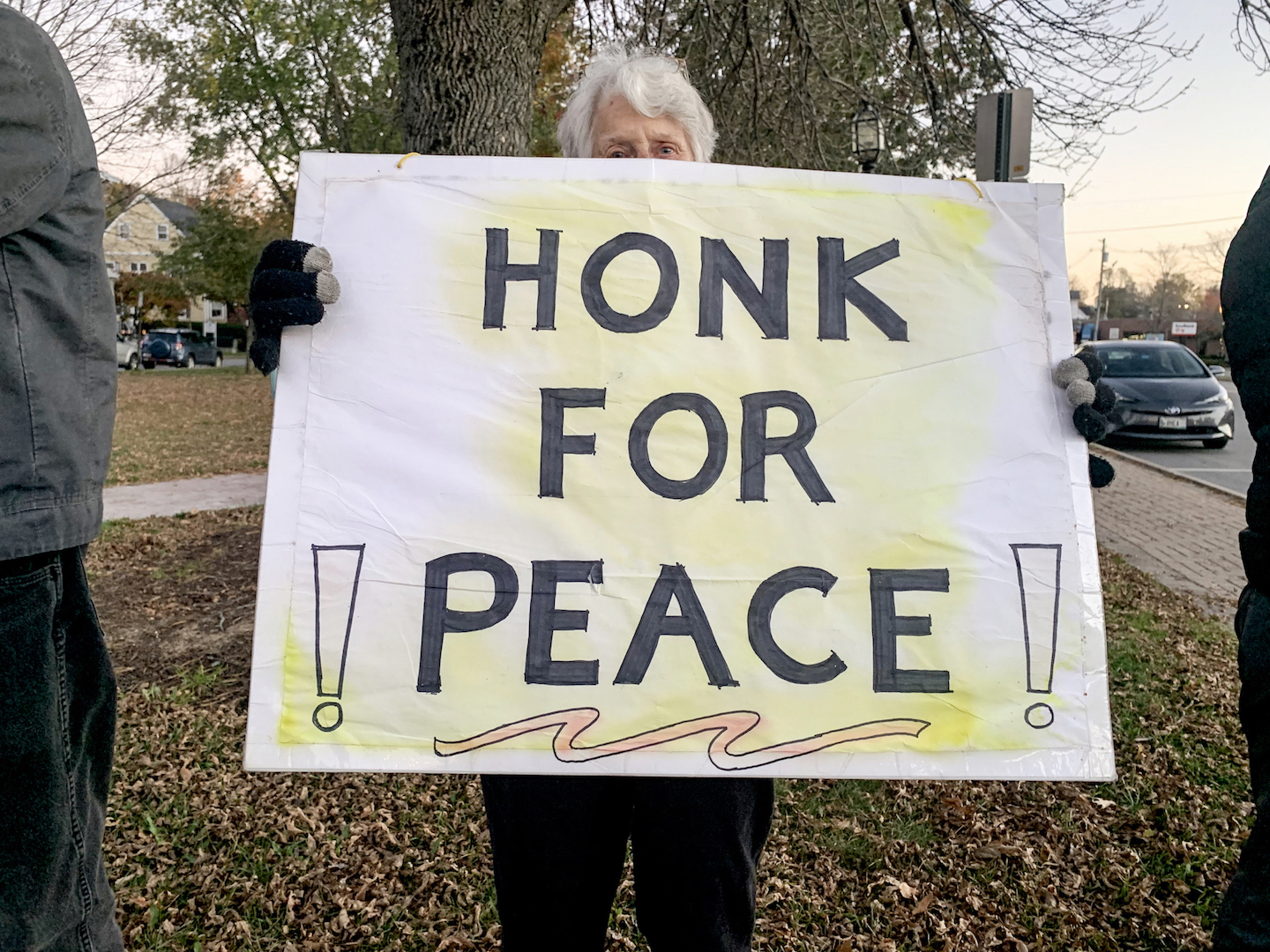Let’s try love: Brunswick group fights for peace
November 12, 2021
 Halina Bennet
Halina BennetEach Friday since the Sept. 11, 2001 terrorist attacks, a group of Brunswick residents gather on the town green on Pleasant and Maine Streets, armed with signs calling for world peace. Initially conceived of as a protest to urge the United States government not to retaliate in the wake of the 9/11 attacks, the group has continued to convene every Friday at 5:00 p.m. for the past 20 years.
This fiery congregation is part of the larger organization PeaceWorks, whose mission is to “educate the community on issues important to citizens of a democracy and encourage nonviolence,” according to their website.
“The goal is to educate ourselves and the community about issues that are of vital importance to this planet that the mainstream media does not fully inform us about,” said Roselie Paul, a longtime PeaceWorks’ member and Bowdoin alumna.
The group includes a number of community members from different groups, including members of Veterans for Peace. The diversity in backgrounds of group members has led to signs ranging from “Black Lives Matter,” to “War is Not the Answer” at their weekly gatherings.
One of the group’s primary goals is to reassert “peaceful patriotism” and “reclaim” the symbol of the American flag from what they see as its current association with extremist right wing political groups.
“We’re actually looking for this country to be a peaceful country and to lead from a place of compassion and cooperation, rather than dominance and violence,” Paul said. “We’re trying to tell everyone, ‘Let’s try love.’”
Paul is currently concerned with the connection between militarism, economic inequality and the climate crisis. The 1992 Kyoto Protocol gave the U.S. permission to omit its military-specific carbon footprint from its total carbon emissions; Paul explained that there is a petition in circulation this year that will hopefully change this. Paul hopes the petition will help Americans understand the connection between the three issues.
“We cannot solve the climate crisis without cutting the military budget and stopping the wars,” she said. “The military has the biggest footprint of any by far.”
Lisa Savage ’77, a fellow PeaceWorks member and independent candidate for U.S. Senate in 2020, echoed Paul’s concerns regarding the Kyoto Protocol.
“The US negotiated hard to keep military emissions from being counted,” Savage said. “I always think that’s kind of ridiculous because the Earth’s atmosphere is not, you know, keeping track of which nation is emitting greenhouse gases. If we’re not talking about the military’s role in the climate crisis, then we’re not really talking about solving the problem.”
Pilar Tirado, another group member and former assistant professor at the College, stressed that PeaceWorks is about expressing patriotism through peace and uniting group members from all political backgrounds around a central commitment to peace.
“When we had our first gathering in 2001, a few weeks after 9/11, some of our signs said ‘Let us not become the evil that we abhor,’ because we were fearing that we would go and get back at those terrorist attackers,” Tirado said. “Unfortunately, we have become the evil we abhor. We have more bases and nuclear weapons than any other country around the world.”
At the group’s first meeting in 2001, around 90 individuals came out to protest. Since then, numbers have dwindled to closer to 15-20 participants per week, and sometimes only a couple show up. Regardless, the group persists.
Today, the average age of the group is close to 70, but members emphasize their desire to have more student participation from Bowdoin students to reinvigorate youth interest in their cause.
“We come out here in the rain, sleet and snow, and we are all gray haired,” Tirado said. “We need you young people out here fighting with us.”
Editor’s Note, 11/29/21, 1:40 p.m.: In an earlier version of this article Lisa Savage’s party affiliation was misidentified. They ran as an independent candidate for U.S. Senate in 2020.
Comments
Before submitting a comment, please review our comment policy. Some key points from the policy:
- No hate speech, profanity, disrespectful or threatening comments.
- No personal attacks on reporters.
- Comments must be under 200 words.
- You are strongly encouraged to use a real name or identifier ("Class of '92").
- Any comments made with an email address that does not belong to you will get removed.

Thanks for reporting on this community tradition. One correction: I ran for the US Senate last year as an independent after ballot access as a member of the Green Party proved impossible.
Fun fact: US District Court Judge Lance Walker struck down the law favoring the two corporate parties in Maine elections just this week.